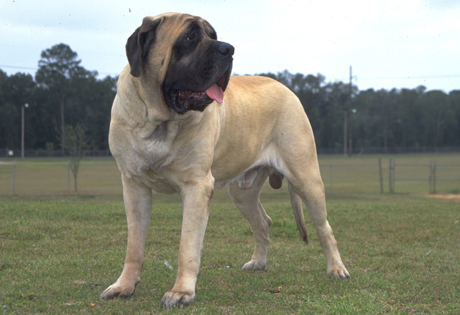 |
| Large and sturdy are two words that describe Mastiffs! (Image Source) |
Mastiffs are some of the largest dogs we see in veterinary
medicine. They were originally bred as watch dogs to guard families and farms
from larger predators. This has made them very loyal to their people, but over
time they have become more couch potato than guard dog. They still may have a
tendency to become protective and with their large intimidating size, it is a
very good idea to socialize puppies and start training classes to make sure
they are as well balanced as possible.
| Even the puppies are big! (Image Source) |
One of the biggest things to remember before taking a
Mastiff into your home, is that you will be dealing with drool…..a LOT of
drool! Make sure everyone in the house is up for slobbery pants and possibly
wet furniture where they lay. Another thing to consider is that although they
tend to be calm and are usually called ‘gentle giants’ remember they are a
giant or large breed. They will require more room to spread out and will come with
a higher price tag on food and medications. Make sure you plan a budget for
your big friend so you are prepared to care for them.
 |
| With their big size, comes a big heart! (Image Source) |
As with most large breed dogs, there are some health
concerns regarding their joints. The larger breeds tend to be predisposed to
hip and elbow dysplasia. Prior to picking out a puppy make sure that the
breeding stock has been certified free of these conditions. This can help
reduce the risk of your puppy having joint issues in the future. Stomach bloat
is also another condition common to larger breed dogs. Using elevated food disease,
encouraging slow eating and resting after eating will help minimize their risk.
Another thing to monitor for are heart conditions. Again making sure that the
parents are certified clear from disease will help but regular veterinary checkups
will also help ensure that your large canine friend stays as healthy as
possible. One other thing to note, in general, the larger breed dogs tend to
have shorter life expectancy. Make sure everyone in your household is
prepared for this. It is not uncommon for Mastiffs to only reach 8-9 years of
age. While this may not seem very long, they can definitely enhance your life
with wonderful memories throughout the time you share.
Mastiffs really are a good family dog. While they do have a
large size, most of the time they are content to just sit and watch the world
go by. They can be protective and cautious around strangers so starting
training early is a great way to ensure that everyone stays safe. For more
information on mastiffs please visit the following websites here and here.

No comments:
Post a Comment